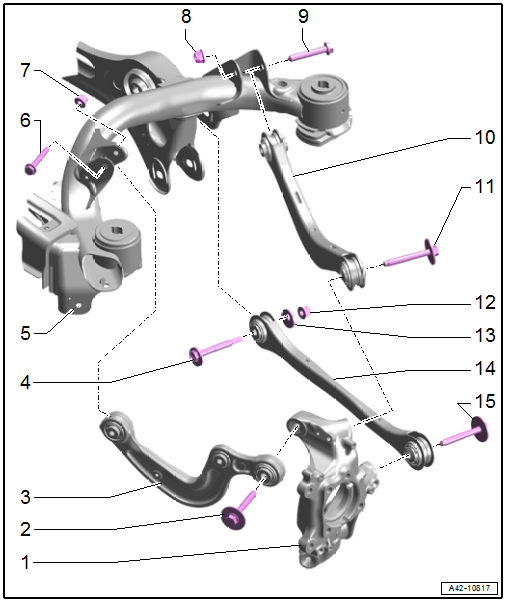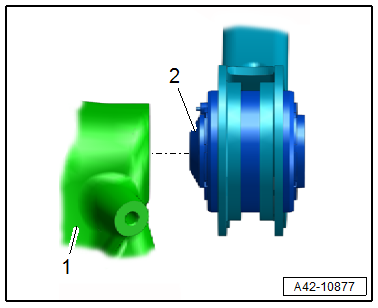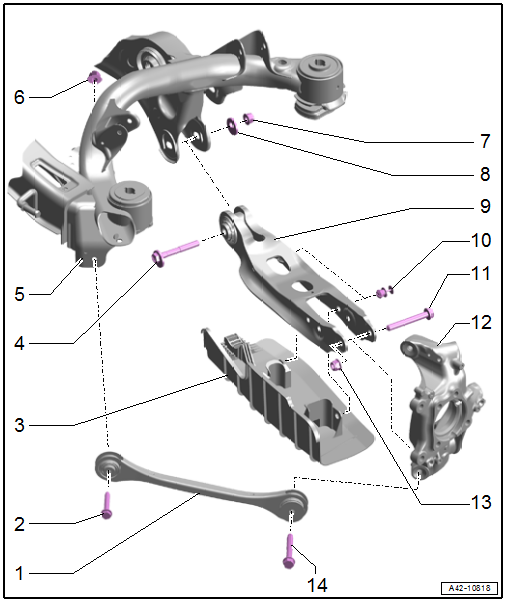Audi A4: Overview - Transverse Link
Audi A4 (B9) 2016-2026 Service Manual / Chassis / Rear Suspension / Control Arm, Tie Rod / Overview - Transverse Link
Upper Transverse Link

1 - Wheel Bearing Housing
2 - Bolt
- 70 Nm + 180º
- Replace after removing
3 - Front Upper Transverse Link
- Removing and installing. Refer to → Chapter "Front Upper Transverse Link, Removing and Installing".
- Installation position. Refer to → Fig. "Transverse Link and Tie Rod Installation Position".
4 - Eccentric Bolt
5 - Subframe
6 - Bolt
- 40 Nm + 180º
- Replace after removing
- Tighten in the curb weight position. Refer to → Chapter "Wheel Bearing in Curb Weight Position, Lifting Vehicles with Coil Spring".
7 - Nut
- Replace after removing
8 - Nut
- Replace after removing
9 - Bolt
- 70 Nm + 180º
- Replace after removing
- Tighten in the curb weight position. Refer to → Chapter "Wheel Bearing in Curb Weight Position, Lifting Vehicles with Coil Spring".
10 - Rear Upper Transverse Link
- Removing and installing. Refer to → Chapter "Rear Upper Transverse Link, Removing and Installing".
- Installation position. Refer to → Fig. "Transverse Link and Tie Rod Installation Position".
11 - Bolt
- 70 Nm + 180º
- Replace after removing
- Tighten in the curb weight position. Refer to → Chapter "Wheel Bearing in Curb Weight Position, Lifting Vehicles with Coil Spring".
12 - Nut
- 110 Nm
- Replace after removing
- Tighten in the curb weight position. Refer to → Chapter "Wheel Bearing in Curb Weight Position, Lifting Vehicles with Coil Spring".
13 - Eccentric Washer
14 - Tie Rod
- Removing and installing. Refer to → Chapter "Tie Rod, Removing and Installing".
- Installation position. Refer to → Fig. "Transverse Link and Tie Rod Installation Position".
15 - Bolt
- 70 Nm + 180º
- Replace after removing
- Tighten in the curb weight position. Refer to → Chapter "Wheel Bearing in Curb Weight Position, Lifting Vehicles with Coil Spring".
Transverse Link and Tie Rod Installation Position
- The ball side -2- on the transverse link or tie rod must engage in the wheel bearing housing -1-.

Lower Transverse Link

1 - Front Lower Transverse Link
- Removing and installing. Refer to → Chapter "Front Lower Transverse Link, Removing and Installing".
- Installation position. Refer to → Fig. "Transverse Link and Tie Rod Installation Position".
2 - Bolt
- Replace after removing
3 - Wind Deflector
4 - Eccentric Bolt
5 - Subframe
6 - Nut
- 40 Nm + 180º
- Replace after removing
- Tighten in the curb weight position. Refer to → Chapter "Wheel Bearing in Curb Weight Position, Lifting Vehicles with Coil Spring".
7 - Nut
- 160 Nm
- Replace after removing
- Tighten in the curb weight position. Refer to → Chapter "Wheel Bearing in Curb Weight Position, Lifting Vehicles with Coil Spring".
- Loosen and tighten using the 21 mm 6-edge socket wrench
8 - Eccentric Washer
9 - Rear Lower Transverse Link
- Removing and installing. Refer to → Chapter "Rear Lower Transverse Link, Removing and Installing".
10 - Expanding Rivet
11 - Bolt
- Replace after removing
12 - Wheel Bearing Housing
13 - Nut
- 70 Nm + 180º
- Replace after removing
- Tighten in the curb weight position. Refer to → Chapter "Wheel Bearing in Curb Weight Position, Lifting Vehicles with Coil Spring".
14 - Bolt
- 70 Nm + 180º
- Replace after removing
- Tighten in the curb weight position. Refer to → Chapter "Wheel Bearing in Curb Weight Position, Lifting Vehicles with Coil Spring".
READ NEXT:
 Upper Transverse Link, Removing and Installing
Upper Transverse Link, Removing and Installing
Front Upper Transverse Link, Removing and Installing
Special tools and workshop equipment required
Torque Wrench 1332 40-200Nm -VAG1332-
Caution
This procedure contains mandatory replaceab
 Lower Transverse Link, Removing and Installing
Lower Transverse Link, Removing and Installing
Rear Lower Transverse Link, Removing and Installing
Special tools and workshop equipment required
Torque Wrench 1332 40-200Nm -VAG1332-
Engine and Gearbox Jack -VAS6931-
Engine/Gearbox Jack Adapte
 Tie Rod, Removing and Installing
Tie Rod, Removing and Installing
Special tools and workshop equipment required
Torque Wrench 1332 40-200Nm -VAG1332-
Engine/Gearbox Jack Adapter - Wheel Hub Support -T10149-
Engine and Gearbox Jack -VAS6931-
Caution
Thi
SEE MORE:
 Front Axle Camber, Centering
Front Axle Camber, Centering
Note
Camber cannot be adjusted.
Camber can be centered evenly within specified tolerance
range by shifting subframe.
Procedure
- Remove the noise insulation. Refer to
→ Body Exterior; Rep. Gr.66; Noise Insulation; Noise Insulation,
Removing and Installing.
-
 Bulkhead
Bulkhead
Overview - Bulkhead
1 -
Lock Washer
2 -
Heat Shield
Overview. Refer to
→ Chapter "Overview - Heat Shield".
3 -
Pass-Through
For coolant lines
Can be replaced only with the heat shield
Equipped on some models
4 -
Seal
For the plenum chamber bu
© 2019-2026 Copyright www.audia4b9.com

